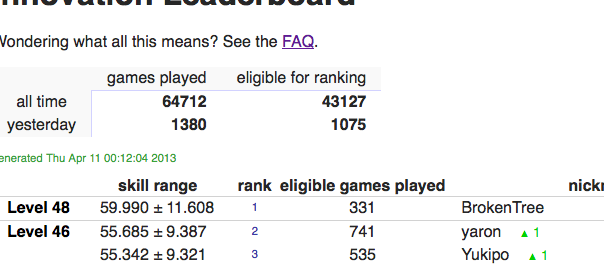1
Innovation Articles / Analysis - What Innovation veterans are really about
« on: August 06, 2015, 03:01:10 pm »
No skills, tricks or fine mechanics is in this article. It is rather personal too.
So what kinds of general disciplines usually within a veteran?
1. Short Game - Sprint for objectives after objectives and lock down the victory
Typical gameplay is like a 6-0 achievement win in base set which they will score shifty and achieve as long as they can. Better short game are usually about how effective you can reduce the action needed while keeping yourself ahead. Generally you dont overscore by much with this kind of gameplay.
2. Long Game - Setup for a huge board/age lead and win the game with overwhelming advantage
No it is not only about spamming industrialization. It is actually more about how you forecast the flow of the game and be ahead on the rhythm. Forecasting cards helps a lot since it is a straight way of investing the future, but other technique applies too. Long game skills is a lot deeper since it is more on strategy and prediction over fine mechanics.
3. Small Game - Race for every ground with the finest mechanics
You may say short game gameplay relies a lot on your small game but small game is not only about that. It is about how you fight for an objective with your opponent. A gameplay example recons small game but not short game is like both sides at 5-5 on achievement with base only and the only achievement left is on age 9. While both sides are on age 8 with enough points, how do you get to achieve age9 first over your opponent.
4. Big Game - How to get your board snowballing
Now industrialization is one of the way to do it, but it is not the only one nor the quickest one(it may be the most fierce though). Get your board going early on and ahead of your opponent then banish them from dogma without sharing while they can never share yours.
5. Control - To keep your opponent away from winning
As one of the player which discipline in control this is my definition of what control is about. It is not only about disrupting your opponent nor destroying their board. It is always about keeping them away from winning, and, if you are so sure that giving them the next 3-4 achievements wont allow them to win, it is actually better to promote them to go that way so they are having their efforts under your gameplan, that is the real thing about controlling.
Apart from this there are skills, tricks, and the most important one the fine mechanics of how you actually play the game. Some of the higher level tricks like prediction, gambling, deception, illusion, board building/stacking, etc.
And there is one more thing: Our read.
It is like re-assessing the situation on a snooker table. Unlike some other board games, there are times that innovation can be highly unpredictable and you will have to rely on your read on the current situation and react accordingly. Usually the most relevant cases are to alert if a problem is already coming (say your opponent is setting up for something or even if they are looking for a card) and you will have to decide if you will stick to your original plan or not.
Most games are about a mixture of gameplays though but there are tendencies. Say kasaski favors big game(although his short game mechanics is really good last time which im quite shocked), while im more about small game and control. We may go for the other way though.
It is sad that a lot of veterans are no longer regularly here.
So what kinds of general disciplines usually within a veteran?
1. Short Game - Sprint for objectives after objectives and lock down the victory
Typical gameplay is like a 6-0 achievement win in base set which they will score shifty and achieve as long as they can. Better short game are usually about how effective you can reduce the action needed while keeping yourself ahead. Generally you dont overscore by much with this kind of gameplay.
2. Long Game - Setup for a huge board/age lead and win the game with overwhelming advantage
No it is not only about spamming industrialization. It is actually more about how you forecast the flow of the game and be ahead on the rhythm. Forecasting cards helps a lot since it is a straight way of investing the future, but other technique applies too. Long game skills is a lot deeper since it is more on strategy and prediction over fine mechanics.
3. Small Game - Race for every ground with the finest mechanics
You may say short game gameplay relies a lot on your small game but small game is not only about that. It is about how you fight for an objective with your opponent. A gameplay example recons small game but not short game is like both sides at 5-5 on achievement with base only and the only achievement left is on age 9. While both sides are on age 8 with enough points, how do you get to achieve age9 first over your opponent.
4. Big Game - How to get your board snowballing
Now industrialization is one of the way to do it, but it is not the only one nor the quickest one(it may be the most fierce though). Get your board going early on and ahead of your opponent then banish them from dogma without sharing while they can never share yours.
5. Control - To keep your opponent away from winning
As one of the player which discipline in control this is my definition of what control is about. It is not only about disrupting your opponent nor destroying their board. It is always about keeping them away from winning, and, if you are so sure that giving them the next 3-4 achievements wont allow them to win, it is actually better to promote them to go that way so they are having their efforts under your gameplan, that is the real thing about controlling.
Apart from this there are skills, tricks, and the most important one the fine mechanics of how you actually play the game. Some of the higher level tricks like prediction, gambling, deception, illusion, board building/stacking, etc.
And there is one more thing: Our read.
It is like re-assessing the situation on a snooker table. Unlike some other board games, there are times that innovation can be highly unpredictable and you will have to rely on your read on the current situation and react accordingly. Usually the most relevant cases are to alert if a problem is already coming (say your opponent is setting up for something or even if they are looking for a card) and you will have to decide if you will stick to your original plan or not.
Most games are about a mixture of gameplays though but there are tendencies. Say kasaski favors big game(although his short game mechanics is really good last time which im quite shocked), while im more about small game and control. We may go for the other way though.
It is sad that a lot of veterans are no longer regularly here.








